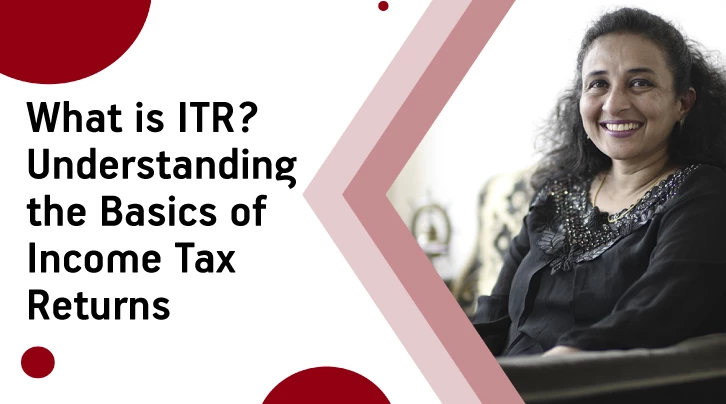If your annual income exceeds the basic exemption limit, you should file Income Tax Returns (ITR). Read this post to understand the basics of ITR.
The Indian government imposes taxes on the income taxpayers generate in a financial year. However, to offer tax relief to low-income individuals, there is an income tax exemption limit of up to Rs. 2.5 lakhs. Individuals whose income in a financial year is above the exemption limit should pay applicable income tax as per their tax slab.
Must read - A Guide to Income Tax Slab for FY 2022-23
Apart from paying income tax, such individuals should also mandatorily file Income Tax Returns (ITR). But what is ITR meaning? How to file ITR? Let’s take a look-
What is Income Tax Return (ITR)?
ITR is a form through which taxpayers provide information related to the income generated and tax paid in a financial year to the tax department. For tax calculations, a financial year is a period starting from April 1 to March 31 of the following year.
Tax returns should be filed before July 31 every year unless the tax department notifies a different date. Moreover, the tax department has issued seven different ITR forms. Taxpayers should choose the correct ITR form based on their income sources, total income generated, and taxpayer category to file their tax returns.
Who Should File Income Tax Returns?
To better understand what is ITR, it is essential to know who should file ITR. Here are taxpayer categories that should mandatorily file tax returns-
-
Individual taxpayers up to 59 years with total income in a financial year above the basic exemption limit of Rs. 2.5 lakhs
-
Individual taxpayers between 60 to 79 years with total income in a financial year above the exemption limit of Rs. 3 lakhs
-
Individual taxpayers above 80 years with total income in a financial year above the exemption limit of Rs. 5 lakhs
-
Individual taxpayers who’ve paid excess income tax and wish to claim a tax refund
-
NRIs whose Indian income in a financial year is above Rs. 2.5 lakhs
-
Individuals with financial interest or assets outside India
-
All the income-generating registered companies, irrespective of whether they generated profits or losses in the financial year
-
Foreign companies claiming treaty benefits on their Indian transactions
Moreover, even individual taxpayers whose income falls under the basic exemption limit are encouraged to file tax returns. But it is not mandatory for them to file ITR.
What are the Different Types of ITR Forms?
The seven ITR forms are as follows-
ITR Form |
Applicability |
ITR-1 (Sahaj) |
Individual taxpayers with a total income of up to Rs. 50 lakhs in a financial year from-
- Salary/Pension
- One house property
- Other sources
|
ITR-2 |
Individuals and HUFs not eligible to file ITR- 1 and not having income from gains and profits from profession or business |
ITR-3 |
Individuals and HUFs with income from gains and profits from profession or business |
ITR-4 (Sugam) |
Individuals, HUFs, and firms (except LLP) with a total income of up to Rs. 50 lakhs in a financial year from the following income heads-
- Profession or business computed on a presumptive basis under Section 44AD, 44AE, or 44ADA
- Salary/Pension
- One house property
- Other sources
*The key difference between ITR-1 and ITR-4 is that while ITR-1 does not include business income, ITR-4 does. Also, while ITR-1 is only for individuals, ITR-4 covers Individuals, HUFs, and firms. |
ITR-5 |
Individuals or entities belonging to bodies like firms, LLPs, Body of Individuals (BOIs), Association of Persons (AOPs), Artificial Juridical Persons (AJPs), business trusts, investment funds, the estate of deceased or insolvent, local authorities, and co-operative societies |
ITR-6 |
All the companies except ones claiming exemption Under Section 11 |
ITR-7 |
Persons including companies required to file returns under Section 139(4A), Section 139(4B), Section 139(4C), Section 139(4D), Section 139(4E), or Section 139(4F) |
What are the Documents Required to File ITR?
You'll need documents like savings account bank statements, salary slips, PAN card, and Aadhaar card to successfully file tax returns. You'll also need the below-mentioned documents-
Form 16
Issued by the employer and includes details, like the salary paid and deduction of TDS (Tax Deducted at Source)
Form 16A
If TDS is deducted on income other than salaries, like interest from FD or RD, above the specified limit prescribed under tax laws
Form 16B
Issued by the buyer and includes details of TDS applicable to the amount received by you from the buyer when you sell a property
Form 16C
Issued by the tenant and includes details of the TDS applicable to the rent received by you if you have a property let out on rent
Form 26AS
It is your consolidated annual tax statement with all the taxes paid against your PAN, including -
o TDS by the employer
o TDS by banks
o TDS by other organizations on any payments you've received
o Advance tax paid by you
o Self-assessment tax paid by you
o Proof of tax-saving investments
o Proofs for claiming tax deductions under Section 80C to Section 80U
o Home loan statement from the lender
File ITR on Time to Avoid Getting Penalized
If you belong to any of the taxpayer categories listed above, you must file tax returns before the due date. Not filing ITR is an offense, and a penalty of Rs. 5,000 is levied on delayed ITR filing.
Now that you know income tax return meaning, who it applies to, and the different types of ITR forms available, use the information to file ITR on time to avoid getting penalized and be a responsible Indian citizen.
Also Read - How to save tax the smartest way?
Mutual Fund investments are subject to market risks, read all scheme related documents carefully.





 1800-270-7000
1800-270-7000




